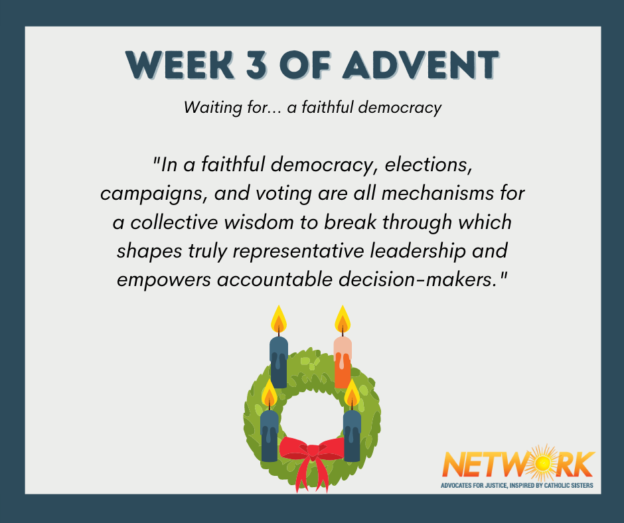
Advent 2020: Waiting for a Faithful Democracy
Sister Quincy Howard, OP
December 13, 2020
During this sacred season of waiting, we anticipate early reforms in the new administration, which will create a more faithful democracy. Since March of 2019 we’ve been waiting: when the For the People Act passed the House and was condemned to the McConnell graveyard. Since 2013 we’ve been waiting: when the Supreme Court’s Shelby County v. Holder ruling gutted the Voting Rights Advancement Act. Since 2010 we’ve been waiting: when the Supreme Court’s Citizens United v. FEC ruling gave free rein for dark money and special interest donors to manipulate elections and influence elected decision makers. In some ways, you could say we’ve been waiting since 1787, when the original democratic experiment was founded within an exclusionary, racist political and economic system. The ideals of democracy articulated by the Founders are an “already, but not yet” scenario—they knew then that the creation of a more perfect union would be an unfolding process.
In 2020, a faithful democracy has never felt more distant. This year’s election was a shameful display of the influence that racism, sexism, power, and money still have in our democracy. Witnessing the fragility and exploitation of our democratic systems during such a vulnerable time in our nation has been utterly discouraging. Sometimes it feels like the democratic experiment is failing.
A new report from the University of Cambridge’s Centre for the Future of Democracy shows that people around the world are collectively losing faith in democratic systems. The drop in satisfaction has been especially rapid and consequential in the U.S. with a majority of citizens (55%) expressing dissatisfaction with democratic government for the first time. This marks a profound shift in our nation’s view of itself — Americans seem to be getting tired of waiting.
In 2020 our democracy is on life support. Suppression tactics to hamper voter participation have become campaign strategy. Gerrymandered districts reflect the needs of the party in power, not the constituents. It is often impossible to know the sources of campaign attacks and fear-mongering half-truths. While these weaknesses were on full display, a coordinated misinformation campaign by the loser’s party is dangerously undermining voters’ trust in elections.
In a faithful democracy, elections, campaigns, and voting are all mechanisms for a collective wisdom to break through which shapes truly representative leadership and empowers accountable decision-makers. This is the open-loop system that, at its best, brings about a more perfect union. Transformational reforms are needed to get us there, and they cannot wait another election cycle.
The For the People Act is a comprehensive package of policy fixes that are far-reaching in scope. They run the gamut from automatic voter registration and a small donor matching program to ethics rules for elected officials and ending gerrymandering. The For the People Act is the best chance we have to end the dominance of big money in our politics, to ensure that public servants work for the public interest, to make voting easier, and to protect the security of our elections.
This transformative bill will be a top priority in the next Congressional session. Its opposition has painted For the People as partisan, but that’s only the case on Capitol Hill. Elsewhere, transformational reforms that make our democracy more accountable, more representative, and more secure is the hope that voters are waiting for.







